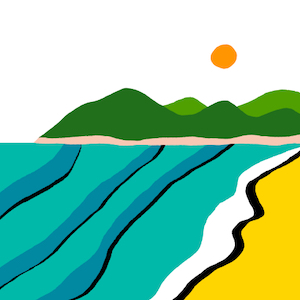Junkboy is the nom de plume of Essex born-and-raised, East Sussex dwelling brothers Mik and Rich Hanscomb. Through a variety of labels – that includes at different stages Moshi Moshi, Enraptured Records, Wool Recordings and Second Language Music – they’ve been releasing music for twenty years: quietly critically acclaimed and under the radar. ‘More of a life as opposed to a career in music’ the brothers quip.
2019 sees the release of their sixth album, their first since 2014’s Sovereign Sky and their first for Fretsore Records. Trains, Trees, Topophilia is a collection of instrumental music inspired by seasonal tipping points, nature, place and memory. That intersecting point where public transport facilitated movement and variations of greys, greens, yellows, browns and blues induces a daydreaming state of a halcyon, perhaps imagined, past.
Taken from the album, We have the pleasure in premiering their video for Old Camera, New Film, a title that caught my attention immediately, being a die-hard analogue photographer. One of the most personally rewarding things about film photography (partly brought about through the act of slowing down) is that I’ve become more aware of my surroundings. The mundane and every-day objects take on new depths and a strange beauty. I got that same sense of connection when looking at some of Christopher Harrup’s photography from Essex Topographic, a project that inspiredTrains, Trees, Topophilia.
Photographs are as much an inner reflection of the photographer, while Harrup’s work captures the everyday traces of life left momentarily on the landscape, his choices and the way he presents them are very personal. Likewise, Junkboy paint with music revealing part of their own journey, the results are pastoral-like projections that are both dreamlike and cinematic; music to lose yourself in. A feeling that they heighten on the video for Old Camera, New Film, a journey through place and memory.
‘Our friend and photographer, Christopher Harrup, self-published a book about ten years ago called Essex Topography’, explains Rich. ‘This was the seed of a personal journey Mik and I took whilst making this record, thinking about the photographs of the Thames Estuary that our friend Christopher took and our own experiences writing memories onto the landscape via train journeys between Seaford and Brighton in Sussex to Southend on Sea in Essex’
‘We wanted the music to reflect the rhythms of travel and to be a response to the contrasting beauty of the Thames Estuary with all their New Town splendour and the sweep of the South Downs’

Mik continues ‘As this album was started near twenty years on from our first ever seven inch single and was inspired by concepts of memory, we dug back into our collective musical consciousness listening again to mid to late 90s Chicago Post-Rock but also 60s baroque-pop and the British pastoral-jazz soundtracks of Micheal Garrick. We were also digging the landscape art of Paul Nash, John Piper and Graham Sutherland and trying to make our album the incidental music to an Anglicised version of Monte Hellman’s Two-Lane Blacktop that exists only in our head…’
The brothers were aided and abetted by friends Will Calderbank (Mumford and Sons) performing cello, Becka Wright (Buffo’s Wake) on violin, Owen Gillham (Jeannine Barry) plucking banjo, frailing e-bow and caressing Fender Rhodes and Dave Woodhead (Billy Bragg) playing flugelhorn. They also collaborated with musical polymath, Oliver Cherer (aka Dollboy amongst other names) writing the Paul Nash inspired A Chance Encounter.
https://www.facebook.com/junkboytheband/
